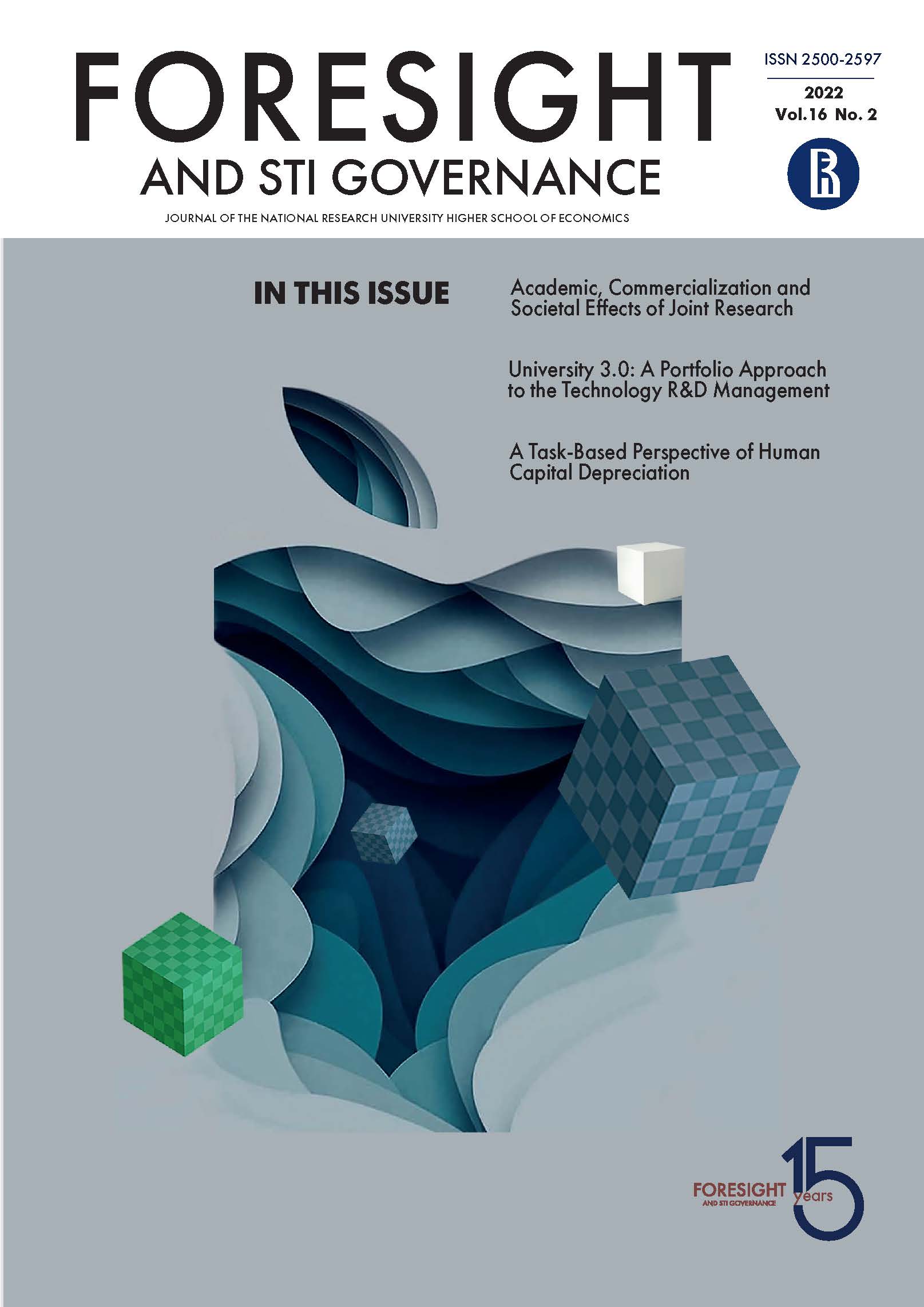Abstract
This article investigates the link between human capital depreciation and job tasks, with an emphasis on potential differences between education levels. Using data from the German Socio-Economic Panel, fixed effects panel regression is applied to estimate an extended Mincer equation based on Neumann and Weiss’s model. Human capital gained from higher education levels depreciates at a faster rate than other human capital. The depreciation rate is also higher for specific skills compared to general skills. Moreover, the productivity-enhancing value of education diminishes faster in jobs with a high share of non-routine interactive, non-routine manual, and routine cognitive tasks. These jobs are characterized by greater technology complementarity or more frequent changes in core-skill or technology-skill requirements. The presented results point to the urgency of elaborating combined labor market and educational and lifelong learning policies to counteract the depreciation of skills. Education should focus on equipping workers with more general skills in all education levels and adapt educational programs to take into account the rapid upgrade of production technologies and changing competency requirements.
References
Arrazola M., Hevia J.D. (2004) More on the estimation of the human capital depreciation rate. Applied Economics Letters, 11(3), 145-148. DOI: https://doi.org/10.1080/1350485042000203742
Autor D., Dorn D. (2013) The Growth of Low-Skill Service Jobs and the Polarization of the US Labor Market. American Economic Review, 103(5), 1553-1597. DOI: https://doi.org/10.1257/aer.103.5.1553
Autor D., Handel M. (2013) Putting tasks to the test: Human capital, job tasks, and wages. Journal of Labor Economics, 31(S1), S59-S96. DOI: https://doi.org/10.1086/669332
Autor D., Levy F., Murnane R.J. (2003) The skill content of recent technological change: An empirical exploration. The Quarterly Journal of Economics, 118(4), 1279-1333. DOI: https://doi.org/10.1162/003355303322552801
Backes-Gellner U., Janssen S. (2009) Skill obsolescence, vintage effects and changing tasks. Applied Economics Quarterly, 55(1), 83-104. DOI: https://doi.org/10.3790/aeq.55.1.83
Becker G. (1964) Human Capital, New York: Columbia University Press.
Carliner G. (1982) The wages of older men. Journal of Human Resources, 25-38. DOI: https://doi.org/10.2307/145522
De Grip A. (2006) Evaluating human capital obsolescence, Paris: OECD. https://www.oecd.org/els/emp/34932083.pdf, accessed 25.03.2022.
De Grip A., Van Loo J. (2002) The economics of skills obsolescence: A review, Bingley (UK): Emerald Group Publishing Limited.
Dengler K., Matthes B., Paulus W. (2014) Occupational tasks in the German labour market (FDZ-Methodenreport 12/2014), Berlin: Institute for Employment Research. https://doku.iab.de/fdz/reporte/2014/MR_12-14_EN.pdf, accessed 24.02.2022.
Frey C.B., Osborne M.A. (2017) The future of employment: How susceptible are jobs to computerisation? Technological Forecasting and Social Change, 114, 254-280. DOI: https://doi.org/10.1016/j.techfore.2016.08.019
Groot W. (1998) Empirical estimates of the rate of depreciation of education. Applied Economics Letters, 5(8), 535-538. DOI: https://doi.org/10.1080/135048598354500
Haley W.J. (1976) Estimation of the earnings profile from optimal human capital accumulation. Econometrica: Journal of the Econometric Society, 44(6), 1223-1238. DOI: https://doi.org/10.2307/1914256
Heckman J.J. (1976) A life-cycle model of earnings, learning, and consumption. Journal of Political Economy, 84(4, Part 2), S9-S44. https://www.jstor.org/stable/1831101.
Holtmann A. (1972) On-the-job training, obsolescence, options, and retraining. Southern Economic Journal, 38(3), 414-417. DOI: https://doi.org/10.2307/1056910
Johnson T., Hebein F.J. (1974) Investments in human capital and growth in personal income 1956-1966. The American Economic Review, 64(4), 604-615. https://www.jstor.org/stable/1813313.
Lentini V., Gimenez G. (2019) Depreciation of human capital: A sectoral analysis in OECD countries. International Journal of Manpower, 40(7), 1254-1272. DOI: https://doi.org/10.1108/IJM-07-2018-0207
Mincer J. (1974) Schooling, Experience, and Earnings, Cambridge, MA: NBER.
Mincer J., Ofek H. (1982) Interrupted work careers: Depreciation and restoration of human capital (NBER Working Paper 0479), Cambridge, MA: NBER. DOI: https://doi.org/10.3386/w0479
Murillo I.P. (2011) Human capital obsolescence: Some evidence for Spain. International Journal of Manpower, 32(4), 426-445. DOI: https://doi.org/10.1108/01437721111148540
Muro M., Liu S., Whiton J., Kulkarni S. (2017) Digitalization and the American workforce. Washington, D.C.: Brookings Institution. https://www.brookings.edu/wp-content/uploads/2017/11/mpp_2017nov15_digitalization_full_report.pdf, accessed 16.01.2022.
Neuman S., Weiss A. (1995) On the effects of schooling vintage on experience-earnings profiles: Theory and evidence. European Economic Review, 39(5), 943-955. DOI: https://doi.org/10.1016/0014-2921(94)00019-V
Ramirez J. (2002) Age and schooling vintage effects on earnings profiles in Switzerland. In: The Economics of Skills Obsolescence (eds. A. de Grip, J. van Loo, K. Mayhew), Bingley: Emerald Group Publishing Limited, pp. 83-99. DOI: https://doi.org/10.1016/S0147-9121(02)21006-7
Rodrigues M., Fernández-Macías E., Sostero M. (2021) A unified conceptual framework of tasks, skills and competences, Brussels: European Commission.
Rosen S. (1975) Measuring the obsolescence of knowledge, Cambridge, MA: National Bureau of Economic Research.
Spitz-Oener A. (2006) Technical change, job tasks, and rising educational demands: Looking outside the wage structure. Journal of Labor Economics, 24(2), 235-270. DOI: https://doi.org/10.1086/499972
Weber S. (2014) Human capital depreciation and education level. International Journal of Manpower, 35(5), 613-642. DOI: https://doi.org/10.1108/IJM-05-2014-0122

This work is licensed under a Creative Commons Attribution 4.0 International License.


